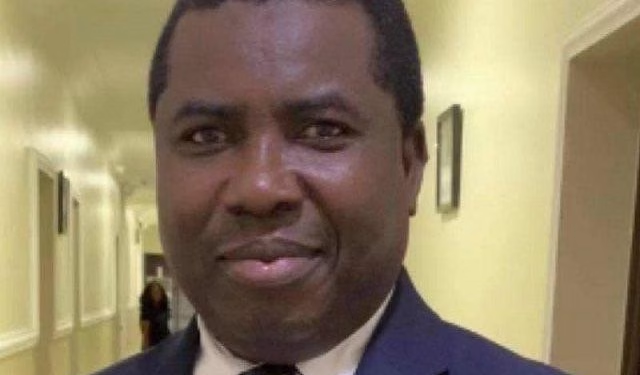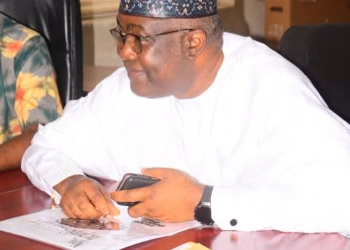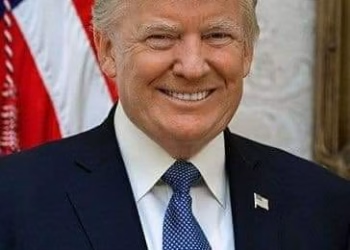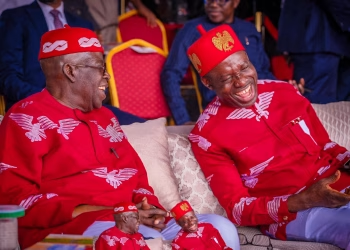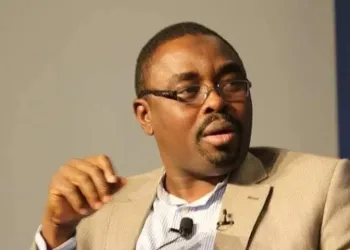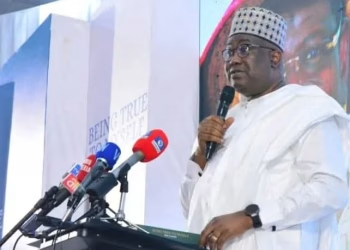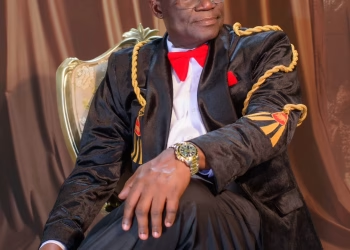By Ezenwa Nwagwu
Since the appointment of the new chairman of the Independent National Electoral Commission (INEC), commentaries and analyses have already begun setting expectations and agenda as usual. Many of the commentaries I have read and listened to have been dominated by questions around the personality of the new Chairman – is he a good man? Is he a man of integrity?
Some Nigerians have even rushed to look at his records and have tried to define who he is and what he represents.
For me, it’s not expedient to talk about the personality of the INEC chairman. I think it is wasteful to dwell on whether a man is good or bad. The challenge we have as a country is that Nigeria’s governance culture leans too much towards a commandist approach, one that elevates individuals over institutions. I have always insisted that the personalisation of power remains one of our deepest structural weaknesses. We like to believe that if we can just find a “good man,” all our problems will disappear. But nations are not built on goodwill; they are built on systems.
So, I would rather prefer to discuss how individuals fit into legal frameworks of institutions. Therefore, in this discussion, what I would prefer to do is to unpack and deflect expectations of Nigerians in an individual as a solution to the myriads of challenges we face during elections.
First is to say that until we develop a culture of institutional thinking where structures, laws, and processes guide our actions rather than whims, progress will remain elusive. A functional democracy depends less on the morality of individuals and more on how those individuals fit into the legal and institutional frameworks that govern them. Even a good man, when inserted into a flawed system, risks being corrupted or rendered ineffective.
So, before Nigerians heap unrealistic expectations on the new INEC chairman, my intervention is to help Nigerians, to first understand the complexities of the terrain he inherits, one defined by layers of interests, legal constraints, and political pressure. It is my opinion, therefore, that the real real task for the new INEC chairman is not to be a “good man,” but to build continuity, deepen transparency, and strengthen institutional independence.
Understanding INEC’s Structure
Let me start with the struture of INEC. An INEC Chairman operates within a complex network. He works with 12 national commissioners, two of whom represent the six geopolitical zones. The governors and indeed some powerful stakeholders in those zones play a very significant role in who comes to represent those zones. If you recall, when there was a vacancy when Festus Okoye esq finished his tenure at INEC, it took about a year before a replacement could be made and that was because of the contest between the governors of the states in that zone as to which of the states will nominate his replacement. So, these 12 national commissioners worship in different shrines and drink from different ponds, speaking literally. When they come to the commission, they come with the baggage of the people who nominated them, the expectations of their zones. That is one of the complexities of the kind of federalism that we are practicing.
Add to these are 37 Resident Electoral Commissioners (RECs), one per state, who are appointed through the same political process. They will have to be nominated by the president or by these other interests from the states where those national commissioners are coming from. The people who nominate most of these RECs are many times politicians or fronts for politicians.
Even when you don’t have political inclination and you are appointed, there is some level of loyalty to the man or woman responsible for your nomination. These 37 RECs are not the subjects of the national chairman. They are not his “staff,” so he can not unilaterally remove them.
The chairman can only, with sufficient evidence, suspend him or her. This process sometimes involves the entire leadership having to agree to suspend the REC. The Commission can only suspend a REC. To remove an REC, you have to go to the National Assembly and get two-third approval of members. The point I’m making is that these RECs are coming with their baggages. Baggages of who facilitated their appointment and also baggages of the states they have come to represent in the commission.
To put this into context is like the relationship between the president and governors. The President runs the federation with governors, who are not appointed by him but elected by the people. The method of removing a governor is the same method of removing a president. You have to go through impeachment, and that impeachment has a process. In that sense, the president is not the boss of the governor. The president can not direct a state governor. Even with all the issues around state of emergency, there has to still be a nod by the national assembly and he has to create an environment that makes the NASS agree with him that the governor should be suspended, but not removed.
After these RECs, you have another 37 administrative secretaries. While a REC is a political appointee, the administrative secretary is a career bureaucrat within INEC who has grown in ranks at about level 16 or 17. Who also clashes with the political appointees. “We know the job.” So there’s truly no love lost most of the times between the administrative secretaries and the RECs. Beneath them are 774 electoral officers across local governments and over a million ad-hoc staff during general elections. All of these people, including about 14,000 permanent staff of the Commission, worship in different shrines. Each layer comes with competing loyalties, expectations, and interests.
The whole point I’m making is that this is the minefield the new INEC chairman must navigate. His success will depend not on his personal integrity alone but on his ability to manage competing interests and maintain institutional cohesion.
The Politics Beneath the Process
Every election in Nigeria is only as good as the Resident Electoral Commissioner in charge of that state. I must emphasise again that the INEC chairman oversees people he did not appoint, and this reality limits his control.
For instance, the forthcoming Anambra election in November, the INEC chairman on that day will be in the situation room in Abuja. It is the resident electoral commissioner and the 21 electoral officers and whatever number of ad-hoc staff and two or three supervising national commissioners and a few RECs that will be on the ground in Anambra to administer that election.
Because of the nature of his appointment, the REC is not a surrogate of the national. So, even when national commissioners are deployed to monitor elections in those states, they hardly can give directives. We saw that play out in Adamawa, Abia, and in Sokoto. There was going to be a fisticuff between the national commissioner and the REC in Adamawa. So, my call is, for Anambra, for instance, we should beam the searchlight on the REC and the returning officers. The Anambra election is not a litmus test for the new INEC chairman per se.
It is my opinion that most times, we give comfort to people who wreak havoc down the ladder. Elections are majorly manipulated at polling units. But Nigerians are not interested in how the REC or National Commissioners emerge. Perhaps there is ignorance of knowledge and a belief that the National Chairman appoints the RECs. That’s not how it works.
But beyond all of these, the INEC chairman has his work cut out for him, navigating the terrible minefield that the Nigerian political space is. The first thing he needs to do is to understand the nature, character, and complexities of the Nigerian political class, who always wants a dubious advantage. How does the average Nigerian politician think? If he says “Lagbaja I want you to help me do this, and I’ll give you N100 million.” If you say no, an average Nigerian politician doesn’t believe that it is because you have integrity. He believes it is because another person has given you something higher. So anybody in INEC, not just the chairman, should do well to understand the kind of political environment, the kind of context, the human beings that play in that space and do everything possible not just to understand them but to overcome all the obstacles and temptations they will throw on their ways.
For instance, i.have it on good.authority that politics have now infiltrated the academia. Politicians now invest heavily in who becomes Vice Chancellor, knowing that VCs serve or nominate colleagues who serve as returning and collation officers during elections. The once-innovative idea of using academics for electoral duties — introduced under Prof Attahiru Jega to restore credibility after the Iwu era – has become another layer of political maneuvering.
Meanwhile, career civil servants within INEC feel alienated. Many of them, trained over decades in electoral management, are sidelined in favor of politically motivated appointees. Their frustration forms part of the silent dysfunction within the Commission’s operations.
Lessons from the Past
In conclusion, my one kobo to the new INEC chairman would be to build on consultations already established by the Prof Mahmood’s leadership. One of the most successful legacies of Yakubu’s INEC was the institutionalisation of consultations with civil society, the media, political parties, and security agencies. These quarterly engagements helped demystify the Commission’s operations.
What that meant was that people can not completely claim ignorance of the workings of the commission except for the purpose of mischief. He should intensify those consultations and even probably widen the bracket.
However, one of the most visible weaknesses of the Mahmood”s INEC was its public issues management. In my view, the administration was weak in public issues management and political communication. I have not been able to wrap my head around the reasons for that in terms of being proactive in engaging issues on timely basis in a way that even when those public actions are defensible, they.hand mischief makers.talking points and.allow conjectures and conspiracy theories to emerge and thrive and then wait until they issue statements that say liitle or reports. One of the best ways
anybody not to know anything is to put it in a report. Some.nigerians , including those who are invested in the elections, do not read those reports. Otherwise, if anybody was reading those INEC reports, nobody would be saying that INEC has not said anything about the “the glitch” of 2023. INEC has explained the glitch in its 2023 election reports . But you find out, even from those who are involved in election work, whether they have opened the pages of that report?
The work ahead demands less hero worship and more structural reform. What Nigeria needs is not a messiah in the INEC office, but a system that works regardless of who sits there. The chairman is not meant to be a dictator; decisions are subject to debate and can even be overruled by a majority of national commissioners. This is how democracy within an institution should work. Yet, because of our military-influenced political culture, Nigerians often crave a “strong man” to command outcomes, a sentiment that undermines institutional democracy.
To truly understand the power of institutional reforms, let’s take a look at the 2023 general elections. Former President Muhammadu Buhari couldn’t have fancied.losing in his home state of Katsina or in Kaduna where he has cult followerssip or in Abuja where he works Likewise President Tinubu
lost in Lagos and Osun states.
The reason was simple. Even if the people around INEC, including Prof Mahmoud himself, wanted to influence the outcomes, they could not have stopped either of them from losing. The reforms introduced by INEC, including technology like BVAS, have returned the power to decide who wins or loses election to the Nigerian people. This, for me, is the power of institutional reforms.
Even many of the politicians in the National Assembly mouthing reforms are beneficiaries of a relatively well conducted election. Otherwise, in the Nigeria of 2003 and 2007, there was no way Abia would be governed by the labor party, NNPP in Kano, Osun, and Adamawa PDP. SDP and other parties in the national assembly.

